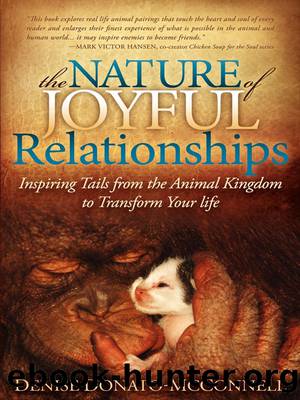The Nature of Joyful Relationships by Donato-McConnell Denise;

Author:Donato-McConnell, Denise;
Language: eng
Format: epub
Publisher: Morgan James Publishing
Mademoiselle Giselle and Finnegan
Over the years, I have learned that if we just let it happen naturally, perfect families form themselves. One of my favorite animal illustrations of this began one September day in 2005 in Seattle, when a small squirrel was found, injured and malnourished. Finnegan the squirrel, as he became known, was lucky enough to be taken to Debby Cantlon, an area resident with a reputation for helping injured and orphaned animals.
Mademoiselle Giselle, Ms. Cantlon's pregnant papillon dog, became an unlikely nurse's aide. She would drag Finnegan's cage through the dining room, kitchen, and hallway to set it beside her own bed. Though Ms. Cantlon had some concerns about what might happen, she finally opened the cage. Mademoiselle Giselle was thrilled and adopted the baby squirrel as her âpup.â Several days after the birth of her own litter, the new mother was seen encouraging Finnegan to nurse with her other babies. After they had fed, the squirrel and the five puppies would nap together. Finnegan didn't question his place in the family as he snuggled contentedly with his âsiblings.â
Our society's conception of family has changed and is still evolving. But if we allow family to be a function of love, it is as natural as a papillon with a litter that happens to include a baby squirrel. In the animal world, there are many examples of orphans being accepted by families of other species. These new mothers are known to nurse, protect, and play with the âdifferentâ baby with the same care they bestow on those they have given birth to. They illustrate how being a wonderful parent is about love in action.
How many people whose biological parents were not up to the task realize that it was really the grandfather, the grade-school teacher, or a friend's parents who raised them? It was not their biological relationship to the person but the person's love that taught them about acceptance and self-esteem.
One of my favorite examples is of a mom who, though she didn't give birth to her child, couldn't have loved him any more. The toddler, recognizing her as his primary caregiver, sensed that she would always be there to mother him. One afternoon, he came home visibly shaken after a visit to his biological mother's house. Gathering the small crying child into her arms, the âmomâ tried to comfort him and sort out what had happened that upset him so. The little guy finally raised his eyes and, looking at her as if she were an illusion, reached out a finger to touch her face. With a puzzled yet immensely relieved expression, he cried out, âYou feel real!â It turned out that his biological mom had told him that the woman he called âMomâ was not his real mom. At two and a half and very concrete, the toddler's frame of reference for someone not ârealâ was the characters in books and videos, who were only imagined and thus couldn't be there to care for or love him.
Download
This site does not store any files on its server. We only index and link to content provided by other sites. Please contact the content providers to delete copyright contents if any and email us, we'll remove relevant links or contents immediately.
The Lonely City by Olivia Laing(4136)
Animal Frequency by Melissa Alvarez(3765)
All Creatures Great and Small by James Herriot(3532)
Walking by Henry David Thoreau(3243)
Exit West by Mohsin Hamid(3205)
Origin Story: A Big History of Everything by David Christian(3150)
COSMOS by Carl Sagan(2966)
How to Read Water: Clues and Patterns from Puddles to the Sea (Natural Navigation) by Tristan Gooley(2891)
Hedgerow by John Wright(2787)
The Inner Life of Animals by Peter Wohlleben(2779)
Origin Story by David Christian(2698)
How to Read Nature by Tristan Gooley(2673)
Project Animal Farm: An Accidental Journey into the Secret World of Farming and the Truth About Our Food by Sonia Faruqi(2671)
How to Do Nothing by Jenny Odell(2654)
Water by Ian Miller(2602)
A Forest Journey by John Perlin(2593)
The Plant Messiah by Carlos Magdalena(2462)
A Wilder Time by William E. Glassley(2369)
Forests: A Very Short Introduction by Jaboury Ghazoul(2342)
